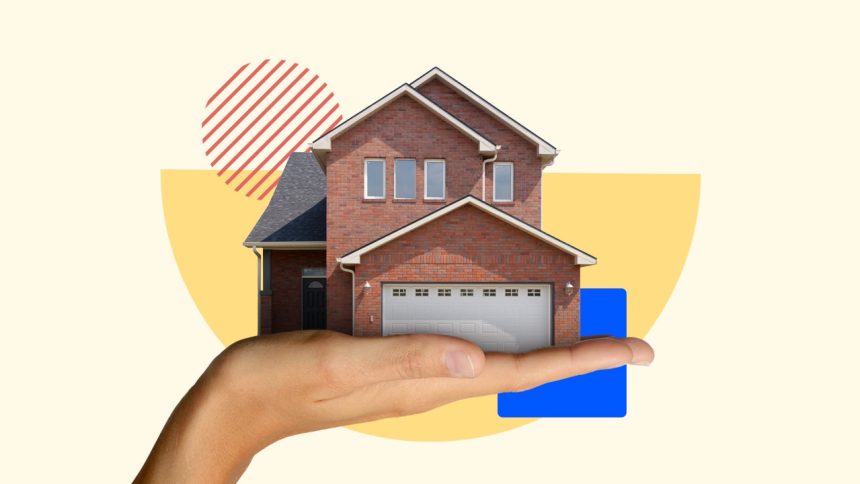Key takeaways
-
If you have a solid credit score, manageable debt load and steady income, you could be in a good position to buy a house.
- However, you’ll also need to have enough money set aside for a down payment and closing costs.
- Before buying, make sure you’re ready for other homeownership-related costs, including property taxes, homeowners insurance and maintenance.
Renting gives you the freedom to move when you want, without the responsibilities of homeownership. But at some point, most people yearn for their own home. Buying a house is a good way to start building financial security. As you pay down the mortgage, you build up home equity, which is a valuable financial resource.
Of course, today’s combination of high home prices and high mortgage rates is not exactly working in your favor. Higher rates mean monthly mortgage payments can be a struggle — or even a barrier to homeownership altogether. And there are plenty of other factors to consider, too.
“Housing affordability is a challenge for many prospective homeowners,” says Mark Hamrick, Bankrate’s senior economic analyst. “It pays to shop around for the best mortgage interest rate when the time does come to buy. All too many buyers only focus on the price of the home when there are other factors that also help to determine monthly payments.”
8 signs you’re ready to buy a house
Do you frequently find yourself wondering whether to keep renting or buy a home, or asking yourself, “Am I ready to buy a house?” Here are eight signs that you’re ready to make the switch from renter to homeowner.
1. Your rent is rising
Rent prices can be every bit as prohibitively expensive as mortgage payments. Data from Redfin shows that in June 2025, the national average rent was $1,642 — down 0.48 percent from the year before.
Rising rent makes it harder to budget for monthly housing costs and save for other financial goals. When paying rent begins to feel like a bad investment and you want to build equity for the future, it’s time to think about a mortgage, says Bill Golden, a real estate agent with Keller Williams Realty Intown Atlanta. “If you’ve seen your rent escalate significantly and you feel trapped, the balance may be tipping toward buying,” he says. “Your monthly outlay could be less on a purchase.”
2. Your credit score is solid
Some renters can’t make the leap to homeownership because they don’t qualify for a mortgage. Low credit scores are a common reason: A history of late payments or too much debt will hurt your score. One sign that you’re ready to buy a home is having a healthy credit score, says Bruce McClary, a senior vice president at the National Foundation for Credit Counseling in Washington, D.C.
Although borrowers with a credit score as low as 500 can qualify for some home loans, they will be required to make bigger down payments and pay higher rates. A higher credit score gets you better interest rates and loan terms.
To check your score, get a free copy of your credit report and examine it carefully. Look at what’s bringing down your score and focus on improving in those areas, as well as paying down your debt in general. “Establishing a credit history or recovering from a credit setback can take time, but the goal of homeownership is still realistic under those circumstances,” McClary says.
3. Your debt is manageable
Another thing lenders look at when screening mortgage applicants is their debt-to-income ratio, or DTI. This key metric evaluates your monthly debts against your monthly income. The higher your DTI, the more risky you appear to a lender — a lower DTI will also allow more wiggle room in your budget to put money aside for home repairs and other unexpected expenses. Use Bankrate’s DTI calculator to figure out yours.
“Keeping credit card balances low and debt under control is beneficial in many ways,” McClary says. “Keeping your balances at or below 30 percent of the available credit limit has a positive influence on the credit score.” If your credit utilization ratio is above that threshold, you may want to improve it before applying for a mortgage. You can do that by paying down your bills and keeping long-standing credit cards open — even after they’re paid off.
Consider the 28/36 rule
The 28/36 rule is a commonly used guideline that says you should spend no more than 28 percent of your gross monthly income on housing costs, and no more than 36 percent on all your combined debt. This can help ensure you’re not overextending yourself.
4. You can afford a down payment and closing costs
“First-time homebuyers don’t have proceeds from another home to help fund a down payment. It’s one of the main reasons why the down payment is the biggest hurdle to homeownership,” says Rob Chrane, CEO of Down Payment Resource, which finds programs that help people buy homes.
Down payment requirements are a percentage of the overall home price, and they can vary greatly depending on the type of home loan you get. For conventional loans, 20 percent down is usually required to avoid paying private mortgage insurance. (Some mortgages require much less down, but keep in mind that the less you pay upfront, the more you’re borrowing — and so the more interest you’ll pay over time.)
For a $400,000 home, which is pretty close to the national median price, 20 percent comes out to $80,000. If that amount sounds scary, there are many grants and programs to help homebuyers with down payments. “There is a wide range of programs for homebuyers today — we track more than 2,500 homeownership programs across the country administered by federal, state, county or local government agencies, nonprofits and employers,” says Chrane.
Buyers should also be ready for closing costs, which typically run from 2 percent to 5 percent of a property’s sale price. The good news is that many of these costs are negotiable. “Because buyers are putting so much of what they have into the down payment, we usually try to get the seller to pay some, if not all, of the closing costs,” Golden says.
5. You have enough set aside for maintenance
When a pipe bursts or the air conditioner goes out in a rental unit, you don’t have to worry about paying for it: That’s the landlord’s responsibility. The same goes for property taxes and routine maintenance expenses. When you’re the owner, though, all those costs are your responsibility — so you need to have enough extra money to handle the added expenses.
A rule of thumb is to set aside at least 1 percent of your home’s purchase price every year to cover maintenance and repairs.
“If you put everything you have into the down payment to buy a house, then you have no money left to do repairs should they come up,” Golden says. “You’re better off spending less on the house so you have some money to make improvements and repairs.” And of course, you need homeowners insurance coverage as well, which can be quite pricey in high-risk areas.
6. You’ve gone through a major life change
Many renters decide to purchase a home after a major life event, such as getting married, says Henry Yoshida, a certified financial planner and senior vice president at Retired.com. A growing family and a new job are other common catalysts for people to buy a home.
“The four major cities in my home state, Texas, are simultaneously on top 10 lists for raising a family and retiring, so I see this firsthand,” Yoshida says. “My own neighbors on either side are retirees from California and a young family who relocated from the Northeast for a job.”
While it’s perfectly fine to buy a house after a big life event, avoid any major changes — like switching jobs or applying for new credit — while you’re in the midst of closing. Your lender will note any change in your financial situation, and in some cases, a change could cause your mortgage application to be rejected.
7. Your lifestyle is stable
Buying a home involves a lot of upfront costs that can take a few years to recoup, so if you anticipate moving before you can recover those expenses, homeownership might not be the right choice for right now.
A renter who is ready to buy a house should also have job security. A stable job means stable income, which lowers the risk that you might stop making your mortgage payments and default on the loan. This is especially true if a recession is looming, as some economists predict — buying a house during a recession is a dicey proposition if you fear your job may soon be in danger.
“In a perfect world, buyers would buy a home well beneath their means so they aren’t devoting so much of their income to the mortgage and other related costs,” Hamrick says.
8. You know what you want
It’s smart to have a good idea of the neighborhood you want to live in and the type of home you want before you begin your quest. Houses, townhouses, condos, duplexes — there are lots of options out there, and each one has its own considerations. If you buy a condo, for example, you won’t have any yardwork, but you will have monthly homeowners association fees in addition to your mortgage payments.
Determine what you need and what is most important to you. Is it being near a good school or a quick commute to your office? Do you mind navigating stairs or having neighbors living above you? Do you want lots of amenities? If you’ve moved to a new city or state to take a job, it might be a good idea to rent until you’ve familiarized yourself with the area. That way, you are more likely to choose a home and neighborhood you’ll be happy in.
Next steps
Ready to leave renting behind? Before you start looking at homes for sale, shop around for lenders and get preapproved for a mortgage. Preapproval helps you know how much house you can afford and what loan program is best for your situation.
Make sure you can still reach your other financial goals, too. Don’t let a new mortgage prevent you from paying down student loans or credit cards, or from saving for retirement.
It’s also important to partner with an experienced local real estate agent. During the house-hunting phase, your agent will use their expertise in your local market to find potential properties that meet your needs and your budget. Once you decide on one, they can help you put together a competitive offer and negotiate with sellers, guiding you all the way through the closing.
FAQs
Additional reporting by Libby Wells
Why we ask for feedback
Your feedback helps us improve our content and services. It takes less than a minute to
complete.
Your responses are anonymous and will only be used for improving our website.
Help us improve our content
Read the full article here















